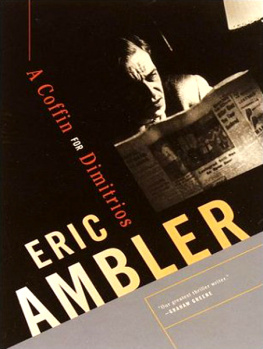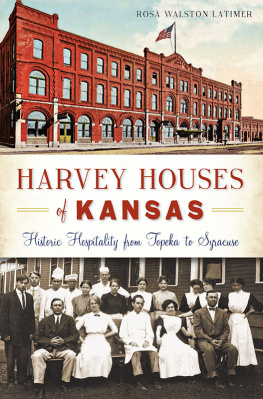A Coffin for Dimitrios
Eric Ambler
To Alan and Felice Harvey
'But the iniquity of oblivion blindely scattereth her poppy, and deals with the memory of men without distinction to merit of perpetuity... Without the favour of the everlasting register, the first man had been as unknown as the last, and Methuselah's long life had been his only Chronicle.'
SIR THOMAS BROWNE:Hydriotaphia
Chapter One
Origins of an Obsession
A Frenchman named Chamfort, who should have known better, once said that chance was a nickname for Providence.
It is one of those convenient, question-begging aphorisms coined to discredit the unpleasant truth that chance plays an important, if not predominant, part in human affairs. Yet it was not entirely inexcusable. Inevitably, chance does occasionally operate with a sort of fumbling coherence readily mistakable for the workings of a self-conscious Providence.
The story of Dimitrios Makropoulos is an example of this.
The fact that a man like Latimer should so much as learn of the existence of a man like Dimitrios is alone grotesque. That he should actually see the dead body of Dimitrios, that he should spend weeks that he could ill afford probing into the man's shadowy history, and that he should ultimately find himself in the position of owing his life to a criminal's odd taste in interior decoration are breath-taking in their absurdity.
Yet, when these facts are seen side by side with the other facts in the case, it is difficult not to become lost in superstitious awe. Their very absurdity seems to prohibit the use of the words 'chance' and 'coincidence'. For the sceptic there remains only one consolation: if there should be such a thing as a superhuman Law, it is administered with sub-human inefficiency. The choice of Latimer as its instrument could have been made only by an idiot.
During the first fifteen years of his adult life, Charles Latimer became a lecturer in political economy at a minor English university. By the time he was thirty-five he had, in addition, written three books. The first was a study of the influence of Proudhon on nineteenth century Italian political thought. The second was entitled: The Gotha Programme of 1875. The third was an assessment of the economic implications of Rosenberg'sDer Mythus des zwanzigsten Jahrhunderts.
It was soon after he had finished correcting the bulky proofs of the last work, and in the hope of dispelling the black depression which was the aftermath of his temporary association with the philosophy of National Socialism and its prophet,Dr Rosenberg, that he wrote his first detective story.
A Bloody Shovel was an immediate success. It was followed by '/,'said the Fly and Murder's Arms. From the great army of university professors who write detective stories in their spare time, Latimer soon emerged as one of the shamefaced few who could make money at the sport. It was, perhaps, inevitable that, sooner or later, he would become a professional writer in name as well as in fact. Three things hastened the transition. The first was a disagreement with the university authorities over what he held to be a matter of principle. The second was an illness. The third was the fact that he happened to be unmarried. Not long after the publication of No Doornail This and following the illness, which had made inroads on his constitutional reserves, he wrote, with only mild reluctance, a letter of resignation and went abroad to complete his fifth detective story in the sun.
It was the week after he had finished that book's successor that he went to Turkey. He had spent a year in and near Athens and was longing for a change of scene. His health was much improved but the prospect of an English autumn was uninviting. At the suggestion of a Greek friend he took the steamer from the Piraeus to Istanbul.
It was in Istanbul and from Colonel Haki that he first heard of Dimitrios.
A letter of introduction is an uneasy document. More often than not, the bearer of it is only casually acquainted with the giver who, in turn, may know the person to whom it is addressed even less well. The chances of its presentation having a satisfactory outcome for all three are slender.
Among the letters of introduction which Latimer carried with him to Istanbul was one to a Madame Chavez, who lived, he had been told, in a villa on the Bosphorus. Three days after he arrived, he wrote to her and received in reply an invitation to join a four day party at the villa. A trifle apprehensively, he accepted.
For Madame Chavez, the road from Buenos Ayres had been as liberally paved with gold as the road to it. A very handsome Turkish woman, she had successfully married and divorced a wealthy Argentine meat broker and, with a fraction of her gains from these transactions, had purchased a small palace which had once housed a minor Turkish royalty. It stood, remote and inconvenient of access, overlooking a bay of fantastic beauty and, apart from the fact that the supplies of fresh water were insufficient to serve even one of its nine bathrooms, was exquisitely appointed. But for the other guests and his hostess's Turkish habit of striking her servants violently in the face when they displeased her (which was often), Latimer, for whom such grandiose discomfort was a novelty, would have enjoyed himself.
The other guests were a very noisy pair of Marseillais, three Italians, two young Turkish naval officers and their 'fiancees' of the moment and an assortment of Istanbul business men with their wives. The greater part of the time they spent in drinking Madame Chavez's seemingly inexhaustible supplies of Dutch gin and dancing to a gramophone attended by a servant who went on steadily playing records whether the guests happened to be dancing at the moment or not. On the pretext of ill-health, Latimer excused himself from much of the drinking and most of the dancing. He was generally ignored.
It was in the late afternoon of his last day there and he was sitting at the end of the vine-covered terrace out of earshot of the gramophone, when he saw a large chauffeur-driven touring car lurching up the long, dusty road to the villa. As it roared into the courtyard below, the occupant of the rear seat flung the door open and vaulted out before the car came to a standstill.
He was a tall man with lean, muscular cheeks whose pale tan contrasted we ll with a head of grey hair cropped Prussian fashion. A narrow frontal bone, a long beak of a nose and thin lips gave him a somewhat predatory air. He could not be less than fifty, Latimer thought, and studied the waist below the beautifully cut officer's uniform in the hope of detecting the corsets.
He watched the tall officer whip a silk handkerchief from his sleeve, flick some invisible dust from his immaculate patent-leather riding boots, tilt his cap raffishly and stride out of sight. Somewhere in the villa, a bell pealed.
Colonel Haki, for this was the officer's name, was an immediate success with the party. A quarter of an hour after his arrival, Madame Chavez, with an air of shy confusion clearly intended to inform her guests that she regarded herself as hopelessly compromised by the Colonel's unexpected appearance, led him on to the terrace and introduced him. All smiles and gallantry, he clicked heels, kissed hands, bowed, acknowledged the salutes of the naval officers and ogled the businessmen's wives. The performance so fascinated Latimer that, when his turn came to be introduced, the sound of his own name made him jump. The Colonel pump-handled his arm warmly.
'Damned pleased indeed to meet you, old boy,', he said.
'Monsieur le Colonelparle bien anglais, 'explained Madame Chavez.
'Quelques mots, 'said Colonel Haki.
Latimer looked amiably into a pair of pale grey eyes. 'How do you do?'
Next page








